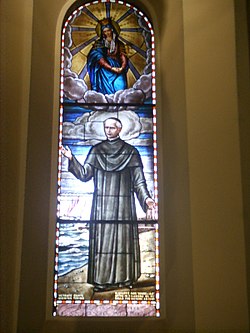Antonio Maria Pucci | |
|---|---|
| | |
| Born | 16 April 1819 Vernio, Florence, Grand Duchy of Tuscany |
| Died | 12 January 1892 (aged 72) Viareggio, Lucca, Kingdom of Italy |
| Venerated in | Catholic Church |
| Beatified | 22 June 1952, Saint Peter's Basilica by Pope Pius XII |
| Canonized | 9 December 1962, Saint Peter's Basilica by Pope John XXIII |
| Feast | 12 January |
Antonio Maria Pucci (16 April 1819 - 12 January 1892) - born Eustachio Pucci - was an Italian Roman Catholic priest and a professed member from the Servite Order. [1]
Contents
He was beatified on 12 June 1952 under Pope Pius XII and was later made a saint on 9 December 1962 [2] at the conclusion of the first session of the Second Vatican Council. [3]
